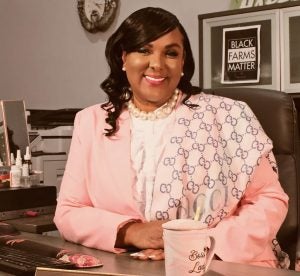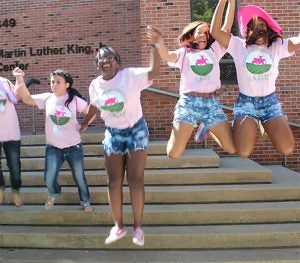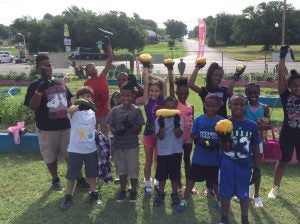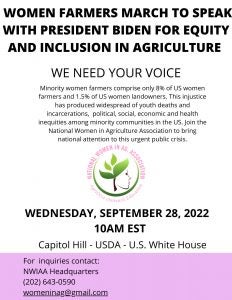“Back in November of 2021, the American Rescue Plan funded 20 organizations deemed underserved producers with the USDA programs and services … but no money was intentionally provided to assist minority, women farmers,” Dr. Tammy Gray-Steele, founder and CEO of the National Women in Agriculture Association had passionately exclaimed over a video interview with AGDAILY.
“We [the NWIAA] need a meeting with President Biden to share our transgressions, ideas for re-evaluating funding, and get the funding we deserve,” Gray-Steele said.
In 2008, the NWIAA was founded in Oklahoma with a mission to save lives and eliminate poverty, and it is now the largest nonprofit women in agriculture organization in the world. It believes in making fresh, locally grown foods available, while expanding economic opportunities. Its members are able to engage each citizen and help to provide a sustainable future for all.

With over 43 chapters around the world, each of their own leadership committees, Gray-Steele sees her organization being an influential stakeholder in the worldwide community, empowering women and minority children alike to know where their food is grown and to offer them healthy lives to lead.
“Through our youth programs, we our minority children understand where their food comes from and offer them a place to learn about agriculture in a hands-on way,” she said.
Alongside her daughter, Jade Steele, they started a program for young, minority women agriculturalists called Junior Agri-Diva Education (J.A.D.E.) through the NWIAA organization. Their goal is to help young minority women build the tools to overcome their life circumstances in underprivileged communities through their involvement in agriculture.
“Our minority children need a place where other minority folks are teaching them about agriculture … so they can see themselves in the process,” said Gray-Steele, a fourth-generation farmer. “If that doesn’t happen, we will continue to see a lack of involvement for our minority children in agriculture in their futures.”

Gray-Steele has been working tirelessly for the past 13 years to lobby for the equitable support and funding for minority women in agriculture — garnering support from organizations such as the National Farmers Union and majority Republican legislatures.
“NWIAA has worked tirelessly to reach minority youths across the country to prepare them for a future in agriculture-providing essential leadership … and training that leads to professional careers in food production and green jobs,” former Republican Rep. Mike Conaway from Texas voiced in a statement.
“NWIAA is conducting important work to improve livelihoods and make communities more vibrant through agricultural education for youth, minorities, and women. … NFU holds these efforts in high esteem,” the National Farmers Union said in a statement last May.

With a decades-long mission to be a part of the world’s ever-growing need for sustainable food systems, a dedicated membership of women agriculturalists, and a desire to provide more resources for minority youth to be involved in the agricultural industry, Gray-Steele needs federal support.
“I have worked so long for years on trying to get federal funding from the federal government. … Our desire is to receive charter funding from the federal government just like 4-H and FFA do. That way, the government will always make room for us as women and minorities in agriculture,” she said.
Gray-Steele also advocates down another avenue, desiring to become a pilot program to provide for 4-H and FFA services to engage disproportionately marginalized students within both organizations and provide them with mentors who share their identities and identify with their background/upbringing.
With minority women and children not currently receiving equitable funding to support programs that will engage them in a higher level of involvement in the agricultural industry, the NWIAA requires action. They refuse to sit back and let the inequity continue.
“Anyone who can make it to D.C. in September to help us advocate for equity and inclusion needs to be there,” Gray-Steele said. “We need your voice.”

On Sept. 28, 2022, the NWIAA will be holding a march to let their voices be heard — they will be journeying to Capitol Hill, the U.S. Department of Agriculture’s offices, and the White House. Their hope is that their voice would be loud enough to garner attention and finally get the meeting with President Joe Biden they have been asking for.
“We want to speak with him about our mission to support minority women and children in agriculture and hopefully get the support we need to support our disadvantaged populations.”
For inquiries and more details on the event, contact the NWIAA headquarters at (202) 643-0590 or email the headquarters at womeninag@gmail.com. If you have the capacity to march in support of their mission, it is a communal and future-focused cause. To help our minority youth see their future in agriculture and support our ever growing industry is essential for the sustainability of it. And to support our minority women supporting our children is what will lead to that essential change of perspective and support for our minority children pursuing agriculture as their future careers.
Bre Holbert is a past National FFA President and studied agriculture science and education at California State-Chico. “Two ears to listen is better than one mouth to speak. Two ears allow us to affirm more people, rather than letting our mouth loose to damage people’s story by speaking on behalf of others.”



